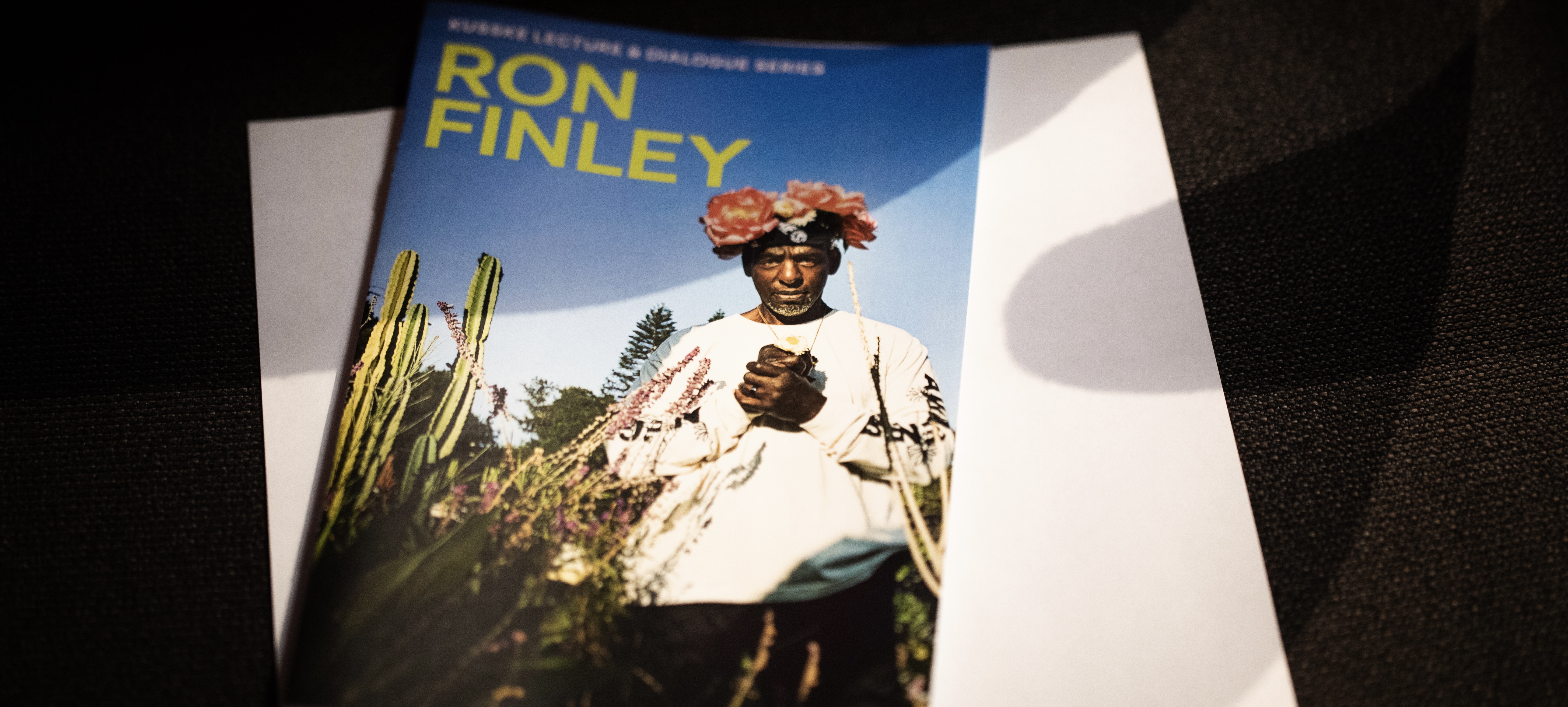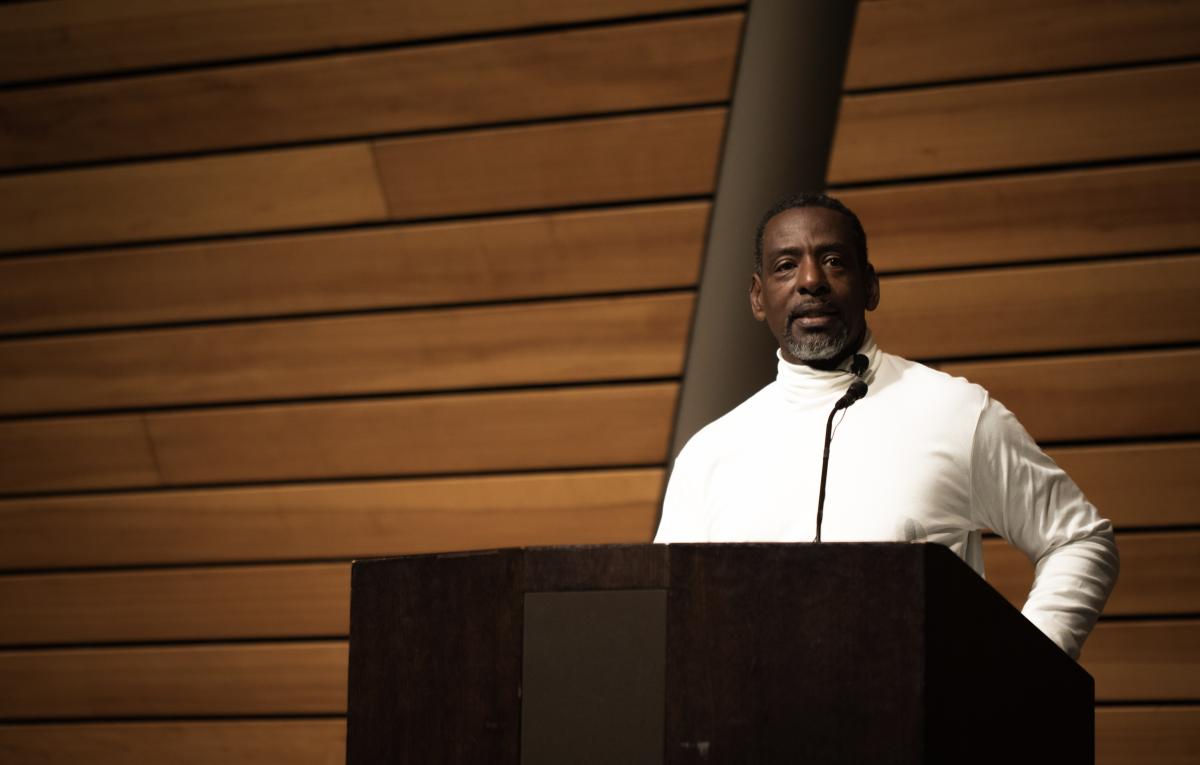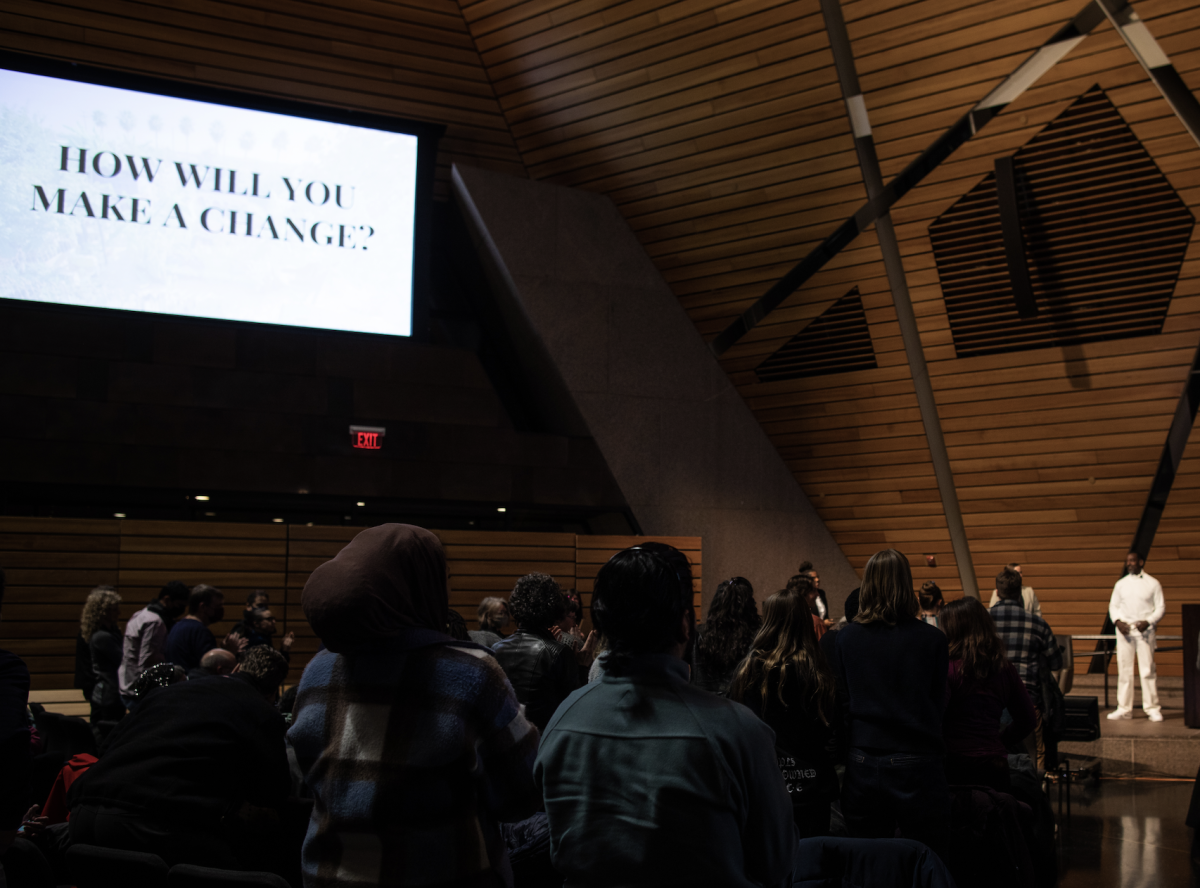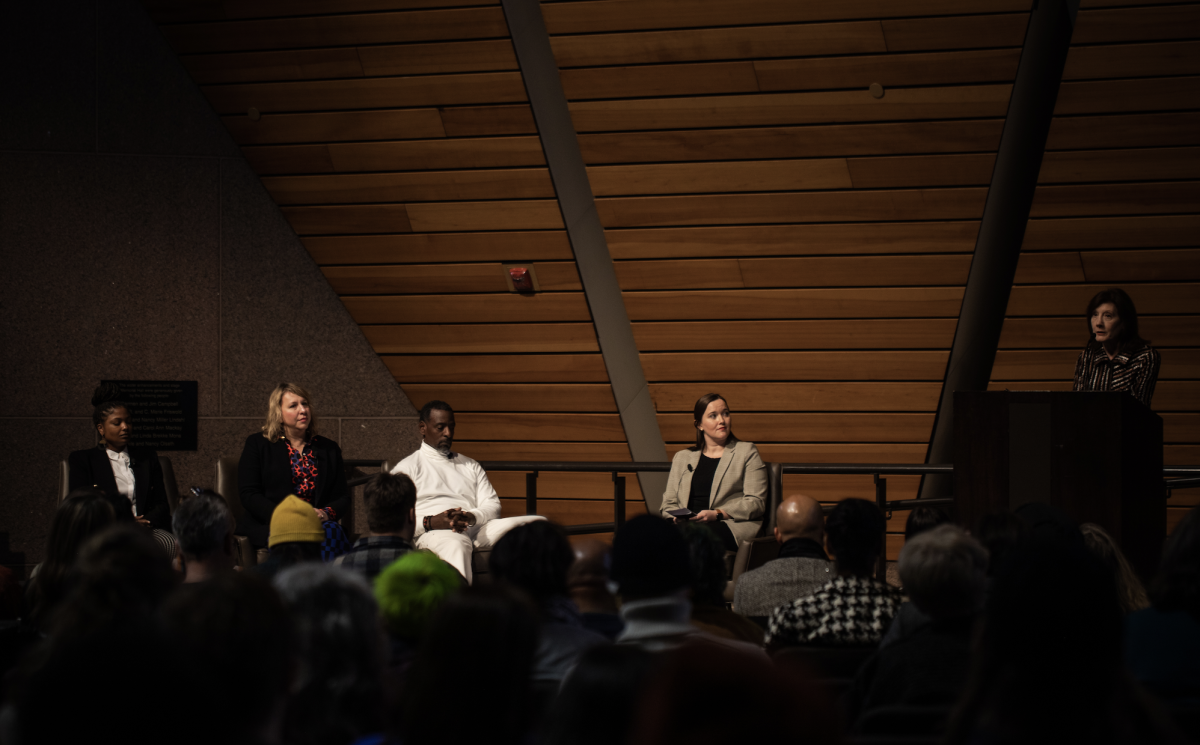The University of Minnesota’s College of Design was pleased to present fashion designer and urban gardening advocate Ron Finley as the featured speaker for the 2022 Kusske Lecture & Dialogue.

Fashion designer and “Horti-Cultural” revolutionary Ron Finley delivered an inspiring keynote encouraging people to see air as the fundamental, shared human need, and land as both a regenerative, regenerating resource and a source of empowerment. “We need to legalize nature. We stand in silence. We sit around being hypnotized and neutralized while nature is being marginalized and commercialized with pesticides,” Finley stated to the audience at the McNamara Alumni Center.
Finley was the speaker for the second annual Kusske Lecture & Dialogue on December 1, 2022. Launched in 2021 with inaugural speaker Frank Gehry, the series brings renowned design practitioners and thought leaders to the College of Design to consider humanity’s most pressing issues and advance dialogue across disciplines, aiming to generate solutions for a radically changing world. The Kusske Lecture & Dialogue series is presented by the Kusske Design Initiative and sponsored by Manitou Fund. Below is a video of speaker highlights, the full event transcript is also available to read.
RON FINLEY ON FOOD INJUSTICE AND HEALTH
Ron Finley lives and works in South-Central Los Angeles, where access to healthy food options are extremely limited. Frustrated by his community’s lack of access to fresh, organic food, and local policymakers’ resistance to alternative approaches, he inadvertently started a “Horti-Cultural” revolution when he turned the barren parkway in front of his home into an edible oasis in 2010. This led to the creation of the Ron Finley Project, which focuses on teaching communities how to transform food deserts into food sanctuaries.
Finley described reasons why he does what he does: cancer, diabetes, obesity. Engaging the audience, he asked, “Who knows someone that has cancer/has died from cancer?” Nearly all of the audience members raised their hands. “Everything you put in your mouth, on your skin … is killing you and they don’t care,” he stated. He encouraged people to see the land as a regenerative resource, empowering people to grow their own food that is healthy and chemical-free.

ON BEING EMPOWERED BY NATURE
More than 20 million Americans live in food deserts—places where residents have to travel, on average, more than three miles to access fresh produce. According to Finley, the way to fix this broken food system is to fight back by planting back.
Despite challenges facing the world in relation to food injustices, Finley expressed optimism about working with communities and training “Earth Warriors”—people who are closely connected with nature and are inspired and empowered by nature. “We need to stop and study nature,” he said. “We are nature.” Noticing natural systems can help inspire environmental appreciation and better design.
Finley also offered ideas on how to bring about change, starting with youth: “We have them pledging allegiance, not to themselves, not to the soil, not to this planet, not to humanity. We show them that they have no value,” he said. Teaching kids to grow food is a life skill that should be encouraged. “There should be a school in every garden—not a garden in every school.”

REDESIGNING SYSTEMS TO IMPACT CHANGE
Following his keynote speech, Finley participated in a discussion with KDI Co-Principals Linsey Griffin (Assistant Professor of Apparel Design and Co-Director of the Human Dimensioning Lab) and Carlye Lauff (Assistant Professor and Graduate Program Director, Product Design), and Design Justice Director Terresa Moses (Assistant Professor of Graphic Design). The four addressed the importance of values and integrity as true health and wealth of humanity.
Lauff acknowledged Finley’s March for Food in Washington, DC, in which he and fellow activists marched three miles from Anacostia Park to the National Mall. They followed the march by planting The People’s Treasury, composed of seed paper money, in front of the Federal Reserve. Their message was printed on the bills: “Growing your own food is like printing your own money.” Their mission was to educate people forced to live in food deserts that despite the lack of grocery stores in their communities, they can take back their health. “No one is telling children that they are expensive and brilliant and magic—the marketers put into peoples’ minds that if they have something, they will have value. You can’t buy value. Just like [you can’t buy] integrity,” Finley explained.

Griffin, Lauff, Moses, and Finley also discussed the impact that design can have on generating progress within social, political, and environmental movements. “There is so much work that we have to do to redesign the systems that are incredibly complex and we have to design for that complexity now in order to make sure that we are not creating more harmful impact—environmentally and socially—making sure that everyone can live justly, and reduce injustices around us.” Moses, who teaches a course titled Racism Untaught, added that understanding positionality is an important element to broadening perspectives: “We all have power and agency that impact what we are consuming, how we are living, and if we don’t teach them [students] about positionality we are going to perpetuate these harmful systems … we have to constantly be changing and shifting so that we can progress forward as a collective.”
Lauff asked Finley how he envisions lasting change. Finley encouraged individuals to work together culturally, embrace their unique individuality, and take power back by planting their own food. “Gardens equal freedom. Gardens are dangerous. This is my weapon of mass creation,” he said. “This is what I do and it’s working.”
To close, Finley (playfully and sincerely) announced: “I am Ron Finley, the gangsta gardener. I want everybody to go out and plant some shit.”
This article was written by KDI Graduate Administrative Assistant Torey Erin.
ABOUT KDI
A generous commitment from Manitou Fund to the University of Minnesota’s College of Design honors the memory of distinguished alumnus Christopher Arthur Kusske (BLA ’78). The Kusske Design Initiative (KDI) honors his legacy through widely inclusive events and collaborations among a growing community of broadminded designers. Chris’s emphases on interdisciplinary dialogue, co-creativity, and celebration of the natural world inspire solutions for planetary-scale issues. By combining values of ecological stewardship with the disciplinary spectrum that forms the college’s DNA, KDI programs and inquiries have transformative potential for the products we use and the environments we inhabit.
The University of Minnesota’s College of Design is pleased to announce that fashion designer and urban gardening advocate Ron Finley will be the featured speaker for this year’s Kusske Lecture & Dialogue on Thursday, December 1.
The University of Minnesota’s College of Design is pleased to announce that internationally acclaimed architect, Frank Owen Gehry, CC, FAIA, will be the inaugural speaker for the new Kusske Lecture & Dialogue Series on Tuesday, November 16.
A generous commitment from Manitou Fund to the University of Minnesota’s College of Design will honor the memory of distinguished alumnus Christopher Arthur Kusske (BLA ‘78).





